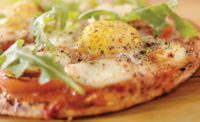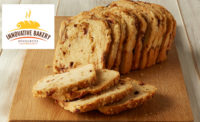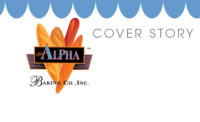It’s well understood in the industry that larger bakeries need to maintain an economy of scale and a rapid pace in automated, computerized production runs in order to remain profitable.
That’s not the case with Chicago Specialty Bakers.
View Extended Slide Show from Chicago Specialty Bakers
“The smaller places are more versatile and are taking over new business,” says Felix Barats, owner and master baker, Chicago Specialty Bakers, Bensenville, IL. “Because the customers, they don’t want a hamburger bun. They want a brioche hamburger bun. They want a pretzel hamburger bun.”
And it’s not just diversity that’s factoring into purchase decisions.
“They want flavor in the bread,” says George Goldberg, vice president of marketing. “That’s the change.”
Chicago Specialty Bakers serves a market that craves customization—and flexibility in the plant.
“We are private bakers,” says Barats. “Most of our work requires understanding our customer. That’s why I always go and see the customer, to work directly with them to create new products.”
Barats goes on almost every sales call—not as a salesman, but as a baker. “I explain what we do, how we do it, and develop the project together with the customer.”
Foodservice roots
“I came into this business by mistake,” says Barats. He got into professional baking to help out a friend—and then studied and worked hard. This approach continues today. “Every year, I go to Europe—especially France and Germany—for special, ongoing training to hone my artisanal baking skills and to discover the latest baking technologies and equipment.”
Chicago Specialty Bakers first set its roots via a string of bagel shops and delis that Barats began in 1982, offering bagels and custom-made sandwiches. The quality of the bagels at the heart of the operation didn’t go unnoticed. Soon, wholesale customers began to call on Barats. Discussions ensued with foodservice chains like Burger King and Starbucks, as well as former Chicago-area grocery chain Dominick’s Finer Foods. Some of these propositions came to fruition, others didn’t—mainly due to the inability to meet requisite quantities with his operation at the time.
With the prospect of better profitability on the wholesale end of baking, Barats stepped out of the storefront and into the plant, and Chicago Specialty Bakers—as it is known today—was born.
But even these days, meeting the demand for product requests can prove challenging. Goldberg notes that the company will go to trade shows, show its breads and regularly receive offers from companies to completely take over all of their production. “That’s not what we are looking for,” he concedes. “We’re looking for small chains—40, 50, 60 stores, regional chains—who want something that is proprietary and custom-made, something that you can tell where it came from.”
Chicago Specialty Bakers doesn’t want to lose the spark that set the wheels into motion—or its niche in the marketplace. “Instead of running straight lines of just one item,” says Goldberg, “we’re saying, ‘Tell us what you need.’”
A specialized market
Chicago Specialty Bakers makes rye bread in “the old-fashioned way,” using all house-made starters. “I personally monitor the sour cultures on a daily basis,” says Barats. “These are living organisms, and I know what to look for.”
People, in general, are starting to pay more attention to bread. “Customers look at the cost of the product first, yet they will pay more for our specialty breads,” says Barats. “They don’t mind doing so, since they are buying a better-quality product.” His first-generation German-American customers have reported that the bread they buy from Chicago Specialty Bakers is the best—and most authentic—they’ve had since coming to America.
Business at Chicago Specialty Bakers heavily focuses on commercial airline customers, with others mainly in foodservice and grocery. Accounts can also go through regional, national and international distributors to order the bakery’s par-baked, frozen products.
Patrons of Chicago-area specialty supermarkets and grocery chains like Fresh Farms International Market, Garden Fresh Market and Joe Caputo & Sons have access to Russian and German rye breads from Chicago Specialty Bakers sold over the counter. Barats also noted a recent sandwich project with Mariano’s Fresh Market.
“We can make all artisanal breads,” suggests Barats. Output regularly includes dinner rolls, French-style baguettes, focaccia, German-style pretzel breads and buns, Italian ciabatta with open-cell structure, and handmade focaccia with toppings.
But the heart and soul of Barat’s operation is in his traditional, levain-based, dark-colored, coriander-topped, sweet-and-sour Russian and European rye breads. This includes a Russian rye known as “Borodinsky”—a type he calls the No. 1 bread in Russia—which he believes will begin to attract more notice within the U.S. marketplace.
“We are the only major wholesale artisan bakery of its kind in this country to use 100% rye flour and a 30-year-old rye levain, which is superior to yeast as a leavening agent,” says Barats. “We make the Borodinsky, the most-popular bread in Russia, the same exact way they make it there. Ours is ‘America’s Borodinsky.’”
Lore has it that the Borodinsky surfaced after the Napoleonic Wars, when the widow of General Alexander Tuchkov set up a convent at the site of the Battle of Borodino in Russia, in which her husband perished, and developed the recipe there.
Barats takes pride in noting that his Borodinsky recipe is 100% his own creation. He also bakes several other types of rye, including a “monastery rye,” made with 85% rye flour, and a product he dubbed “cranberry rye bread cake,” crafted for a special customer.
Pretzel breads have also ramped up at the bakery. “We have three kinds of pretzel products: authentic German and an American version that is softer and sweeter,” says Barats. “We also were the first to make brioche pretzel.”
The lineup at Chicago Specialty Bakers also includes items like French toast soufflés, made with brioche and custard, in four different varieties: raisin, Kalamata olive spinach, ricotta blueberry and ricotta chocolate chip. The products were originally created for an airline customer, notes Goldberg, “but they could go in the big box stores.”
Barats also offers a complete collection of steakhouse breads, which are heavier, denser and have bolder flavors. He also makes unique baguette-style bagels.
Several products are par-baked, to 80% to 90% doneness, then quick-frozen to maintain freshness. The end user bakes the products for 10–15 minutes to finish them, a method that appeals to many types of operations.
But for most of its output, Chicago Specialty Bakers fully bakes the product, then freezes it so the end user only needs to thaw and serve. This approach appeals to select foodservice and other operations that lack a workforce sufficiently skilled to correctly finish a par-baked product.
About 15% to 20% of the bakery’s products are delivered fresh.
An artisanal approach
Barats sees “more bold flavors, and breads that are different shapes and sizes” as strong trends in artisan baking. “Before, customers wanted a more typical style of bread,” he says. “Now they want a more custom style of product, one that is also all-natural, without preservatives.”
And when Barats talks about “artisan,” he means “something you ferment.” He likens the approach to aging fine cheese or beef, enhancing flavor, cultivating sophistication.
Barats vows that the most-important “ingredient” in his bread is fermentation. “You age your dough, you ferment it properly, you handle it properly and that’s the way you get the taste into it,” he says. When a product requires more color, they add malt—not sugar—to create browning. Every product that exits the bakery is all-natural, made without additives or preservatives.
A particularly notable differentiation surfaces with the bakery’s rye. “All of the big bakers in this country are built for high-numbers production,” says Barats. “With rye bread, you really need to build a specific bakery, with specific equipment. It slows down production.” He calls his artisan approach to rye “a dying art.” The sourdough rye products at Chicago Specialty Bakers can take up to three days to make.
Barats has a handful of different rye sours and starters that he uses, insisting, “You have to let it ferment in a natural environment.” The process Barats uses helps his rye bread stay fresh longer than other rye products on the market, he claims.
“We achieve the unique flavors by purchasing the finest ingredients, utilizing the latest techniques and using an Old World approach in fermentation, levain preparation, shaping, molding and expert baking,” says Barats.
“It’s quality,” says Goldberg. “The longer it sits, the better it gets. ‘Time’ is the only ingredient you can’t put on the label. And that’s what can take something good and make it great.”
He adds, “Time is money. The entire food industry is based on how fast you can do it.” The approach Chicago Specialty Bakers maintains brings an ironic meaning to this oft-cited idiom.
Customized technology
Chicago Specialty Bakers operates a 20,000-sq.-ft. plant with four lines, with output of around 1 million pounds of product per week. Development of the first artisan production line took four years; development of the second artisan line was faster, taking only two years. Another line remains strictly devoted to rye breads, specialty products that can require up to 100% hydration. The fourth line handles more conventional products, like kaiser rolls and sandwich buns.
“But no matter what, every product goes through the fermentation process,” says Barats, giving these “more conventional” products an artisan spin. “We don’t take on commodity products that anyone else can make.”
Even with higher-level production runs, Chicago Specialty Bakers incorporates some “made-by-hand” aspects. And the artisanal lines, notes Barats, handle dough “as gently as if it were handled by hand.”
The bakery previously featured traditional proofers, but removed them. “I like to have the breads floor-proofed,” says Barats. “It takes longer, but it gives a better taste.”
What’s next?
The folks at Chicago Specialty Bakers always have new projects in the works, with the latest designed to capitalize on their pretzel expertise—and a growing trend. They’ve dubbed—and trademarked—this emerging product “Pretzel Skins,” a tortilla-style product, but made like pretzel bread—in short, a pretzel tortilla. “We’re talking about something that’s pliable, that you can roll up and make a wrap out of,” says Goldberg.
Rye will continue to form a focus. “The next step for us is promoting our rye bread, because it’s so unique,” says Barats. “We do what the customer wants, but if it was up to me, I would concentrate all of my energy on the rye products.”
The bakery also continues to look to foodservice for opportunities.
“There is such a major change coming in food,” says Goldberg. “It started a few years ago, and it’s just creeping along. It’s the understanding between retail and foodservice. Retail is starting to take business from the restaurants, while restaurants are trying to take business away from the retailer … it goes both ways.”
This presents an opportunity for Chicago Specialty Bakers to bring retail to foodservice, offering breads specially created for the restaurant for customers to purchase and take home. This also presents an opportunity for restaurants to bring these signature breads to grocery store shelves for retail sale. “You’re seeing more restaurant names in the store,” says Goldberg. “They all need co-packers.”
Chicago Specialty Bakers is also looking to expand into a new facility in 2015 that will add a dedicated pretzel line, in addition to the lines for artisanal, conventional and rye products the current plant features. “Expansion and the enhanced capabilities it brings will more than double our current daily output,” says Barats.
Throughout this growth, Chicago Specialty Bakers remains a tight-knit group. “I try to never lose anybody,” says Barats. “I run this like a family.”







